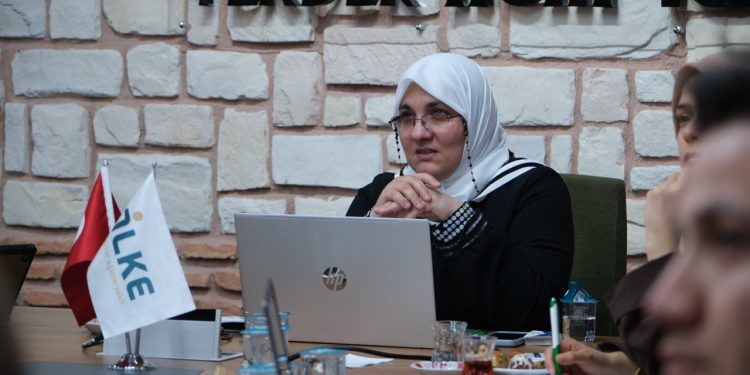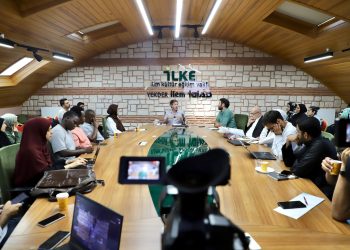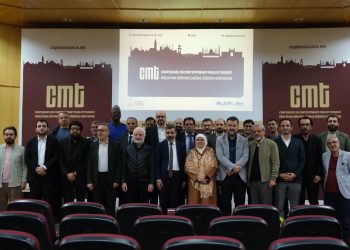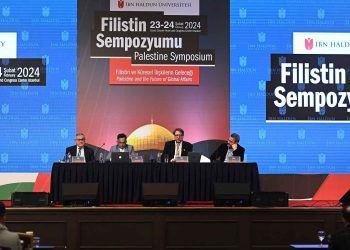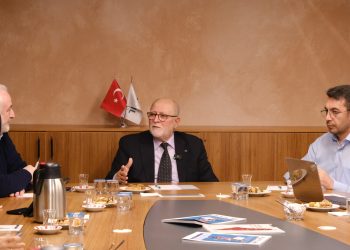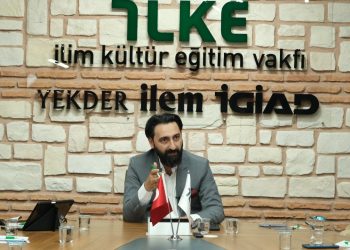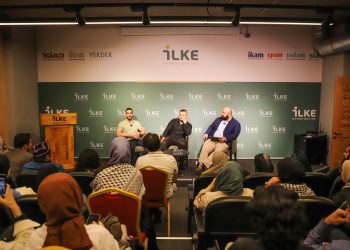In the second session of our new roundtable discussion series, The Platform Talks, held on April 25, we hosted Syrian researcher Kinda Hawasli. In this closed session, academics, researchers, and graduate students had a chance to engage in the discussion on Syria with their questions and comments.
Hawasli began the session with a brief overview of Syria’s shifting socio-political landscape since 2011. She explained the structure of the Assad regime, focusing particularly on changes within the military during the regime’s collapse. Hawasli noted that prior to the revolution, Syria was governed by the Alawite minority, which made up about 10% of the population. In 2011, when people dissatisfied with the Assad regime’s social and economic policies began demanding change, the only response offered to them was “bombing.” However, the military was failing to effectively control the population. In addition to the fact that the monthly salary was between $40 and $70 a month, soldiers who did not want to kill their own people began to leave the army. In 2011, Assad’s army consisted of 325,000 people, and in 2020, there were only 169,000 left. Russian and Iranian military forces were deployed to support the Assad regime’s army. The number of foreign military bases has increased gradually, reaching 801. By 2017, Assad’s army included 100,000-150,000 foreign soldiers, most of whom were affiliated with Hezbollah. She also highlighted that foreign soldiers who came to the country to fight on the side of the Assad regime were obtaining Syrian citizenship. However, following the outbreak of the Russian-Ukrainian war and Israeli strikes targeting Hezbollah after the Operation al-Aqsa Flood, many Russian and Iranian soldiers were withdrawn. This created a military vacuum that made it easier for opposition groups based in Idlib and the Free Syrian Army to achieve significant victories. An operation that initially aimed to capture Aleppo in two to three months ended up reaching Damascus within five days—a surprising success even for the opposition. The gap created by the withdrawal of foreign forces and the weakness of Assad’s army facilitated their victory.
Hawasli also addressed the situation of Syrians who were forced to flee their homeland under the Assad regime, particularly highlighting the plight of internally displaced persons (IDPs). She noted that out of 7 million IDPs, 2 million remain in camps, emphasizing that only a small number have been able to return to their homes. She noted that most of these people are women and children and that they prefer the camps even though they have limited opportunities because they have no home or source of income to return to.
She also discussed the extent to which foreign powers will influence the new Syria. She noted that Iran previously maintained influence in the region by providing economic support to the Syrian army. However, with the loss of this influence, its ties with Hezbollah in Lebanon have also weakened. As a result, Iran has lost all its cards in the game and is now seeking alternative ways to regain its position. Therefore, Iran is trying to organize social media campaigns, edit old videos to create the narrative that Alawites and other minorities are being targeted, and thus provoke international intervention in Syria. Hawasli highlighted that the European Union views the new regime in Syria positively, believing it could help address the refugee issue, while the United States remains largely uninterested in Syria but maintains a critical position due to its control over sanctions. Israel, on the other hand, seeks to coordinate the Druze community in Suwayda, which is divided into three groups, with only one faction supporting Israel, and uses them to advance the David Corridor project. For this reason, Israel opposes Türkiye establishing a military base in Syria.
Finally, she stated that Türkiye will be an important partner for Syria in its reconstruction and diplomatic efforts. Likewise, ensuring security against threats originating from Israel by strengthening stability in Syria makes Syria a critical partner for Türkiye, particularly in terms of security and refugee issues.
Answering a question about Türkiye’s meeting with Assad before the revolution, Hawasli stated that Türkiye played a role in postponing the operation to overthrow Assad. She explained that Türkiye sought a diplomatic solution out of concern that the operation might fail. However, as pressure to carry out the operation grew, Türkiye abandoned its efforts to delay the process and provided support once the operation was successfully completed.
Regarding a question about public opinion on the new government, Hawasli stated that whether the public likes Ahmed al-Shara or not, he is seen as the right person for the transition period. She highlighted that al-Shara’s toppling down of the Asad regime, listening to the people’s demands, seeking solutions to problems, and establishing diplomatic relations, all of which have been positively received by the public. Hawasli added that the government is still trying to understand the current situation and that the economy remains insufficient to fix the system and ensure stability. However, she emphasized that the government is open to reconstruction and investment efforts and does not create obstacles in this process. Therefore, she underlined the need for all civil society organizations, whether Syrian or not, to develop projects aimed at rebuilding Syria. Hawasli also stated that HTS currently presents a democratic image, but it is unclear whether this will change in the future. She pointed out that this uncertainty does not stem from the leadership but from various groups within HTS, stressing that HTS cannot be regarded as a single unified structure, as it consists of multiple factions with differing desires and goals. She concluded by emphasizing that the future form of governance will largely depend on how al-Shara manages these internal factions.
Responding to a question about the situation of women in Syria, Hawasli stated that while Syrian women living abroad are actively and competently involved in various civil society organizations, including political ones, the situation for women inside the country is different. She explained that women in Syria are not currently aiming for direct participation in decision-making processes but are instead focusing on the development of civil society. Hawasli emphasized that, given Syria’s current conditions and cultural structure, it is unrealistic to expect women to rise from zero to senior roles immediately, and that such progress will require time.
Finally, on the issue of the return of Syrians in Türkiye to their country, Hawasli said that she believes a large wave of return will begin soon. However, she noted that the biggest problem is that many Syrians do not have a home to return to. She also added that Syrian students continuing their education in Türkiye will face difficulties adapting to the Arab education system.





































